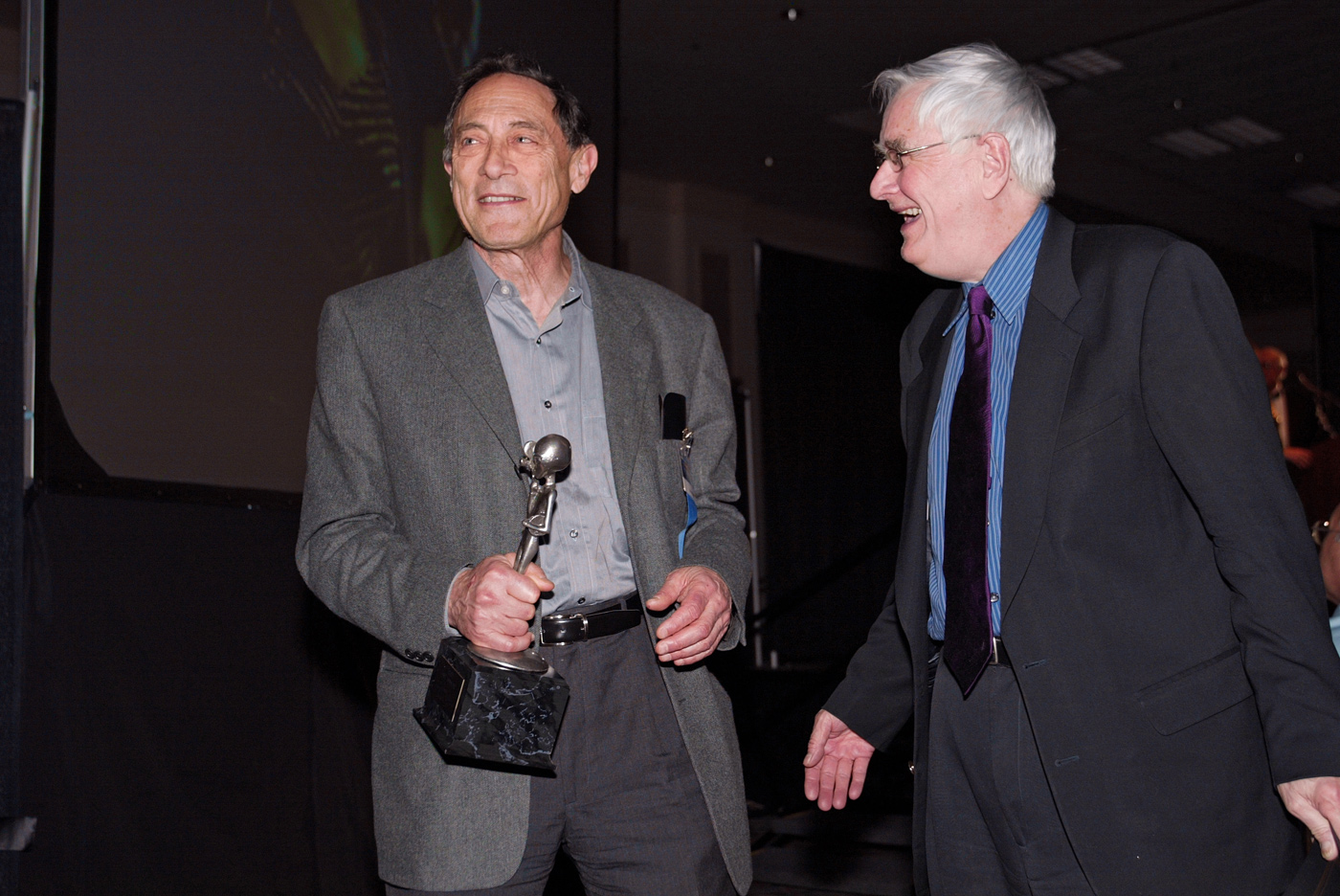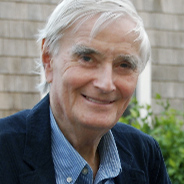Budd Hopkins
interviewed by George Noory on Coast to Coast AM, September 28, 2004

John Mack and Budd Hopkins together at the UFO Congress awards ceremony (Feb 9, 2002); photo by Stuart Conway.
George Noory: A sad moment to bring you aboard, Budd, but I knew how close that John Mack was to you and you to him. So my condolences on behalf of everyone here at Coast to Coast on this very tragic episode.
Budd Hopkins: Well I think it’s a major loss, both on a personal level and for the field, because John was an extremely eloquent spokesman for the reality of the problem, or the issue – the abduction phenomenon, the UFO phenomenon – and a man of great intelligence and an enormous personal warmth. He’s going to be really sorely missed by me especially as a friend.
George Noory: What energy he possessed, Budd. I did not know he was almost 75 years old.
Budd Hopkins: Yup. He, one other interesting little thing [ahem], the fact is that John and I both attended Oblerin College. He graduated two years ahead of me – I just turned 73 myself – and so we were [classmates], although we didn’t know each other at Oberlin. We didn’t meet until 1990. That’s when a colleague of John’s brought him to my studio in New York and I began to show him some of the material that abductees had presented to me, in some of the cases. And he became immediately fascinated.
And this is of course one of the great, great strengths of John’s, that he was open-minded and curious. As every scientist should be, all the time. It should be in the definition of a scientist, that he or she is open minded and curious about, especially, things that might be extremely important new areas of knowledge. And John picked up on it instantly, and went straight into it and never left it. And made some wonderful contributions in his books and in his working with so many people.
I just think that, you know, his loss is such a sudden, sudden shock. There was no sign of illness or of slowing down of his energy, as you mentioned. He had just given a talk at a conference in, I believe Oxford, and had come back to London and had gone to dinner with friends and taken the tube back to his hotel or where he was staying, and he got out and evidently stepped off the curb in a crosswalk area and was instantly hit and apparently almost instantly killed.
George Noory: I just don’t know what to say, too. I’ve continued to monitor the work of you of course Budd and John Mack. And you know, you’re one of the pioneers here for this entire phenomenon of UFO abductions. But John Mack was a scientist, a doctor who decided also to get involved. A Harvard professor. And when I saw those credentials involved in the study that you were undertaking years ago, I began to say, you know finally with people like Hopkins and Mack maybe just maybe we’ll get not only mainstream media to wake up, but maybe we’ll really get to the bottom of this. And that’s what’s so sad about this: we’re losing, and you’re losing, a great arm and a great ally here.
Budd Hopkins: That’s right and John as I mentioned, part of his just sparkling personality – he had a great sense of humor – and at an early conference on the abduction phenomenon when John had first become involved, he said about himself with a sort of a shrug looking around the room and he said “I guess I’m currently the highest ranking prisoner of war in this whole field,” meaning that he was the highest ranking in terms of credentials individual who had left the conventional field of psychiatry and ventured out into this much more difficult and complex and, well, looked-down-upon field, unfortunately by the profession, as UFO research. So he understood the risk he was taking. And he had serious problems at Harvard, as many of us know, as a result of this.
George Noory: No doubt. I am told by law enforcement officials that they have arrested someone in this case and indeed this person was quite inebriated when he was driving his car.
Budd Hopkins: Well that’s a horrible thing. I spoke today at length to very, very good friend of John’s and of mine, the psychohistorian Robert Jay Lifton. I am currently speaking from my studio in Wellfleet, on Cape Cod, which is where Dr. Lifton stays. And he said that his last communication with John, which was just a few weeks ago, John was talking about when he gets worried about a subject or an issue he plunges in. And he said John had become increasingly worried about the direction of the government and had voluntarily gone to New Hampshire – this is his last activity, apparently, in the United States – to work trying to register voters, poor or underprivileged people who had never had a chance, for lots of reasons, to actually get to the polls and to vote. And John was going door to door working with people. And this is a man, as you said, almost 75, who is a man of great importance at his university and so forth, but going to Manchester to enroll voters, hoping to change the regime here in the United States. And this was just one side of his leaping in to a cause which he found to be of extraordinary importance.
George Noory: Do you know if he was working on another book or anything like that, perhaps?
Budd Hopkins: Yes, George. He and I had talked about this. I had spent time with him at the beginning of August at a meeting in Newport. And John was working on a book having to do – and this is, in a strange way, it’s an enormous irony – having to do with evidence suggesting the survival of consciousness after death. Having nothing to do with the UFO field, but this was another area that had engaged his interest, and he was spending a great deal of time on this subject.
George Noory: Like Harry Houdini, who also was really interested in that field, I wonder if John will ever come back to us in some form or fashion.
Budd Hopkins: Well, we can certainly hope.
George Noory: Absolutely. You know, Budd, here at Coast to Coast we have now lost another dear friend of course with the passing of John Mack and several months ago with Dr. Eugene Mallove who was murdered in this particular case, in a case that is still not solved. Both of them in their own way pioneering: Dr. Mallove and his alternative energy, cold fusion; John Mack of course in the field that you have spent so much time in, just trying to unravel this ufo abduction phenomenon. Very sad and also very strange to lose two good people who are really at the forefront of things that no one else really touches.
Budd Hopkins: A friend of mine used to say with irony that if Mother Nature, meaning the Fates, that if Mother Nature were a politician she’d never be reelected. Meaning, that life seems to be arranged in such a way that so many things like this occur that are totally unfortunate: people taken long before their time, or people taken in their prime by crazy accidents. You know George, one of the reasons that I think the conspiracists – the people who develop and weave these vast conspiracy theories that are so fanciful so often – why they flourish is because we find it almost impossible, when we lose someone, to accept a mundane accident. For instance, the analogy with John’s death is a little bit like the death in England of Princess Diana. And it has been, there have been so many theories about the fact that she must have been killed or murdered or something like that for the basic reason that one does not — when one suffers such a loss as the people of England did for this very beloved woman – they could not accept such a mundane explanation as a drunk driver, in that particular case too – in this case the driver of her own car. We just don’t want to think that something that stupid and that absurd and that ridiculous can take from us someone who is so cherished and so valued. So we have to invent something larger, it has to have been some major plot or something, simply to feel better about the loss.
George Noory: Yeah, that’s true. And then we begin to think, “what was he working on? Was it something someone else found out about?” You’re right Budd. Are you going to be ok?
Budd Hopkins: Oh, of course. We’ll all be ok. I’ve, you know, John’s a dear friend. The loss that I remember suffering so strongly years ago was that of Allen Hynek in the field, J. Allen Hynek who was a wonderful man, and I regarded him as a friend, a dear friend. And that loss was enormous but one has to just plunge on and do the work. I’ve had a long conversation today with David Jacobs, my other close, close friend about this subject, the death of John – and Dave and John were friends — and how in a strange way, more responsibilities fall on our shoulders, that is, because work that was being shared say by the three of us now has to be shared by two.
George Noory: That is true, absolutely. Budd, thank you so much and again our deepest condolences on the death of your friend, John Mack. Thank you Budd.
Budd Hopkins: Thank you, George.
George Noory: Budd Hopkins, in his own right a great man. John Mack, dead, age of 74 years old, hit by a drunk driver while he was crossing a street in London last night. He would have been 75 years old next week.
-
 Budd Hopkins is an artist and world-renowned author and pioneer UFO abduction researcher; he is the expert to whom John Mack first turned after being introduced to the subject of alien encounters. Hopkins’ art is in the permanent collections in the Whitney Museum, the Guggenheim Museum, Hirshhorn Museum, and at the Museum of Modern Art.
Budd Hopkins is an artist and world-renowned author and pioneer UFO abduction researcher; he is the expert to whom John Mack first turned after being introduced to the subject of alien encounters. Hopkins’ art is in the permanent collections in the Whitney Museum, the Guggenheim Museum, Hirshhorn Museum, and at the Museum of Modern Art.
© 2004 Premiere Radio Networks
Reprinted by kind permission.